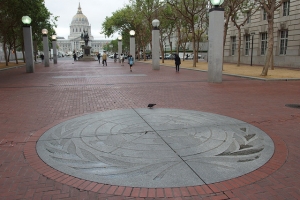Support migrant centric journalism today and donate

 • Watch This Video
• Watch This VideoLate last week the United States Senate announced it had reached an immigration reform "deal" with the White House. The Bush administration and the United States Congress have been locked in a highly volatile debate over reforming immigration laws in the U.S. for over a year.
The United States is about to begun its summer season, kicked off by the Memorial Day holiday weekend. The Congress and George Bush will take a several week vacation, before returning for the summer session, but will take another approximate one month break during August.
<$adv0> The pressure is intense to show some progress on any major political issue as the U.S. government has been in a virtual deadlock over corruption scandals and the Iraq conflict since the election season heated up in earnest at the end of last August.
At the end of 2005, the House of Representatives passed an immigration reform bill that was heavily tilted toward extreme conservative viewpoints. It did not allow for illegal immigrants to remain in the U.S. In fact, it made illegal immigration a felony offense, which would ban for life anyone convicted of violation.
The House bill also focused heavily on building a large wall across a thousand miles of the U.S.-Mexico border, with tens of billions of dollars in spending dedicated toward intense surveillance programs and technology on all U.S. borders.
The Senate bill from early 2006 was less draconian. While calling for increased border security and related support measures, it also tried to find a way to let some illegal immigrants remain in the U.S. legally.
It was like throwing gasoline onto a fire in the American political scene as the summer began and the 2006 election season heated up into one of the most venomous in U.S. history. By the end of the summer, election reform was dead.
And Again
Ever since he was Governor of Texas, George Bush has made numerous political speeches pushing immigration reform. the substance of the speeches and the viewpoint of the types of reform are up for intense debate, but it is an issue that he has pursued throughout his tenure in the White House.
Essentially, Bush favors increased legal immigration form Mexico, especially in the form of a 'guest worker program.' Over the years, the program has been vague, but generally amounts to a temporary work visa that would allow Mexican labor into the U.S. for low paid and menial jobs, but would make it very difficult for those workers to remain in the U.S.
Obtaining permanent residency or citizenship would be nearly impossible under a guest worker visa.
The U.S. Senate has been in a months-long negotiation between conservative and liberal political factions. The negotiations also included representatives from the White House. The proposal announced last week doesn't seem to make anybody happy.
As details of the proposal have come out, both sides have said that it is a 'good start' or a 'good foundation,' but they have then gone on to detail changes they want to see during debate that are mutually exclusive on a number of points.
The Senate will attempt to create a bill out of the debate this week before the Memorial Day holiday. The House of Representatives will then have to take up the bill (whenever it is finished, before or after the holiday break). theoretically, the House and the Senate would agree on a mutual Bill of some sort during the summer, which would then go to the White House for George Bush to sign.
Nobody who has been watching the debate is holding their breath for an immigration reform law by the end of the summer. The conflicts of interest are deeply bitter and intense. Also, the 2008 presidential election has informally started already, more than a year earlier than in the history of the United States. By the time the fall of 2007 arrives, there will be a conflict of the upcoming holiday season, deadlines regarding budgeting and laws for the Iraq conflict, and the 2008 election season will have begun in earnest.
With all that said, immigration reform may well come by the end of the summer. If it does not, then it may not come around again until after the 2008 election about 18 months from now.
Some Key Points of the Senate Proposal:
Current Illegal Immigrants
• only people who arrived before 01 January 2007 are eligible to stay
• a path toward legalization for illegal immigrants
• both a "Y" and a "Z" visa are proposed
• family relations will become less important in determining visas
• a points-based system will be developed to attract immigrants by skills
• minors brought into the U.S. who are still under 30 eligible for green cards in 3 years instead of 8
Border Security
• 18,000 new border patrol agents
• additional 200 miles of vehicle barriers and 370 miles of wall along U.S.-Mexico border
• 70 new ground-based radar and camera towers along the southern border
• undetermined number of new ground-based radar and camera towers along other borders
• deploy four unmanned aerial vehicles and supporting systems
• provide for detaining up to 27,500 illegals per day on an annual basis
Workplace Enforcement
• secure and effective identification tools to prevent unauthorized work
• require employers to electronically verify legal eligibility of new employees
• increase penalties for unlawful hiring, employment and record keeping violations
Future Immigrants
• Spouses and minor children of U.S. citizens and permanent residents would be eligible for green cards based purely on their family connections, but other relatives such as adult children and siblings would not.
• 380,000 visas a year would be awarded based on a point system; scores would depend on about 50% employment criteria, 25% education, 15% on English proficiency and 10% on family connections
• new limits to U.S. citizens seeking to bring foreign-born parents into the country
• visas for parents of U.S. citizens would be capped annually at 40,000
• visas for spouses and children would be capped annually at 87,000
Related:
• US Senate announces proposal on immigration overhaul legislation• The US Congress will begin immigration reform, again
• Spotlight - immigration reform in the United States
• US business gears up for immigration-reform fray
• States in the US passing their own immigration laws
• Canada and the US to implement tighter border controls
• US plans to build more fences to control illegal immigration
• Mexico seeking EU and United Nations support to oppose US security wall
• The economics of immigration in the US
• Catholics call for 'humane' immigration policies in the US





















